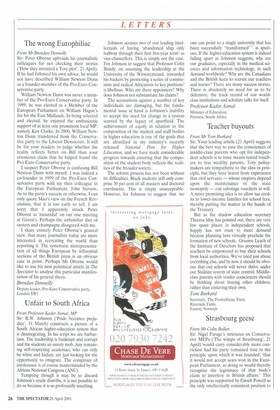Unfair to South Africa
From Professor Kader Asmal, MP Sir: R.W. Johnson (Pride becomes prejudice', 31 March) constructs a picture of a South African higher-education system that is disintegrating. In his script we are barbarians. The leadership is bankrupt and corrupt and the students an unruly mob. Any remaining self-respecting academics, who can only be white and Indian, are just looking for the opportunity to emigrate. The conspiracy of intolerance is of course masterminded by the African National Congress (ANC).
Tempting though it may be to discard Johnson's crude diatribe, it is not possible to do so because it is so profoundly insulting. Johnson accuses two of our leading intellectuals of having 'abandoned ship only halfway through their first five-year term' as vice-chancellors. This is simply not the case. For Johnson to suggest that Professor Colin Bundy, on assuming the leadership at the University of the Witwatersrand, 'rewarded his backers by promoting a series of communists and radical Africanists to key positions' is libellous. Who are these appointees? Why does Johnson not substantiate his claims?
The accusations against a number of key individuals are damaging, but the fundamental issue at hand is Johnson's inability to accept the need for change in a system scarred by the legacy of apartheid. The achievement of equity in relation to the composition of the student and staff bodies in higher education is one of the goals that are identified in my ministry's recently released National Plan for Higher Education, and we have made considerable progress towards ensuring that the composition of the student body reflects the realities of the broader society.
The reform process has not been without its difficulties. Black students still only comprise 30 per cent of all masters and doctoral enrolments. This is simply unacceptable. However, for Johnson to suggest that 'no one can point to a single university that has been successfully "transformed"' is spurious. If the higher-education system is indeed falling apart as Johnson suggests, why are our graduates, especially in the medical sciences and information technology, in such demand worldwide? Why are the Canadians and the British keen to recruit our teachers and nurses? There are many success stories. There is absolutely no need for us to be defensive; the track record of our worldclass institutions and scholars talks for itself.
Professor Kader Asmal
Minister of Education, Pretoria, South Africa


































































 Previous page
Previous page